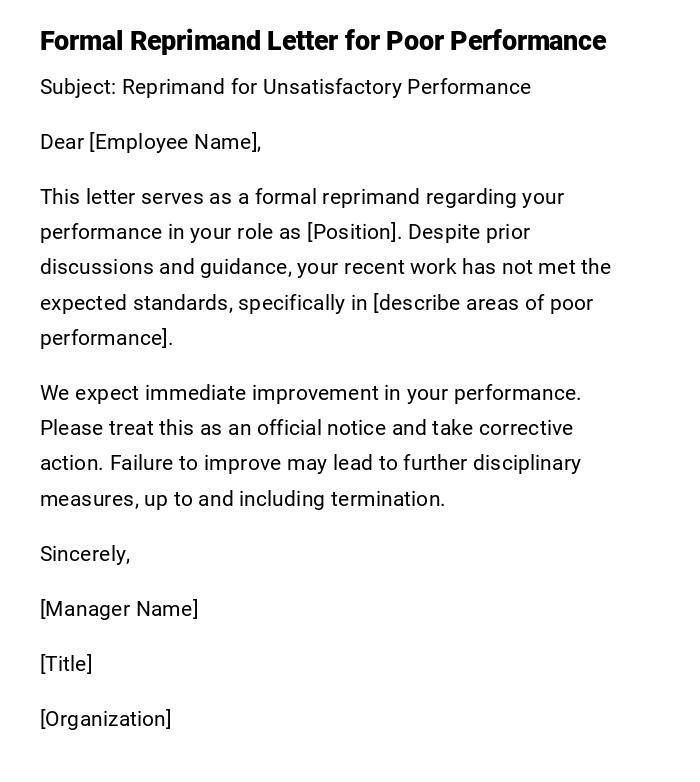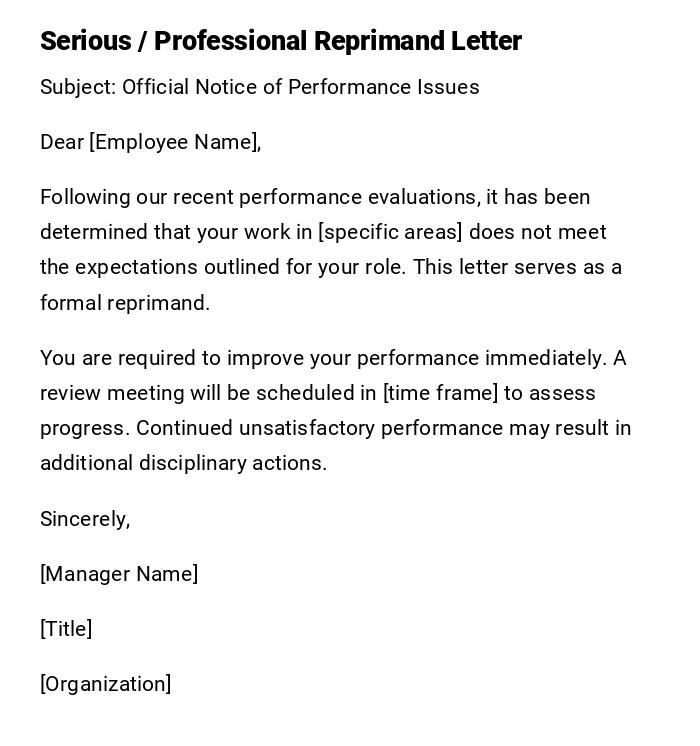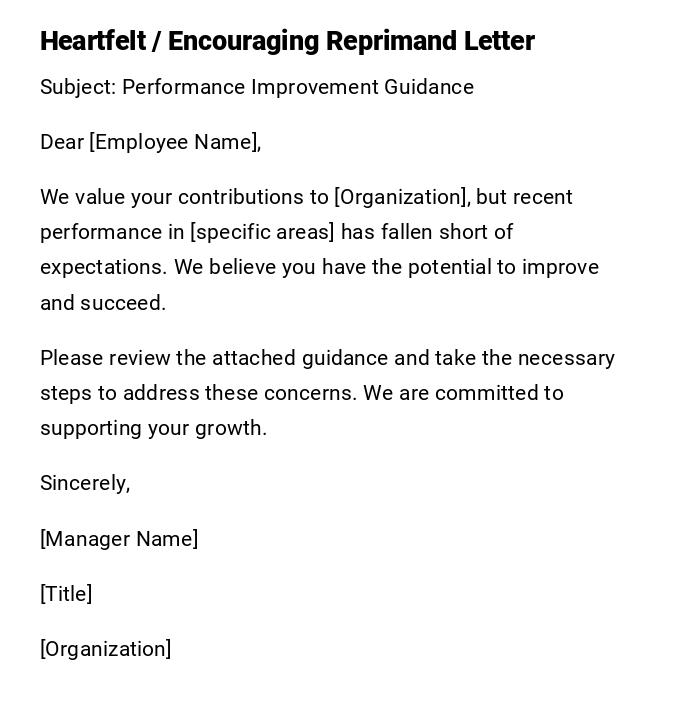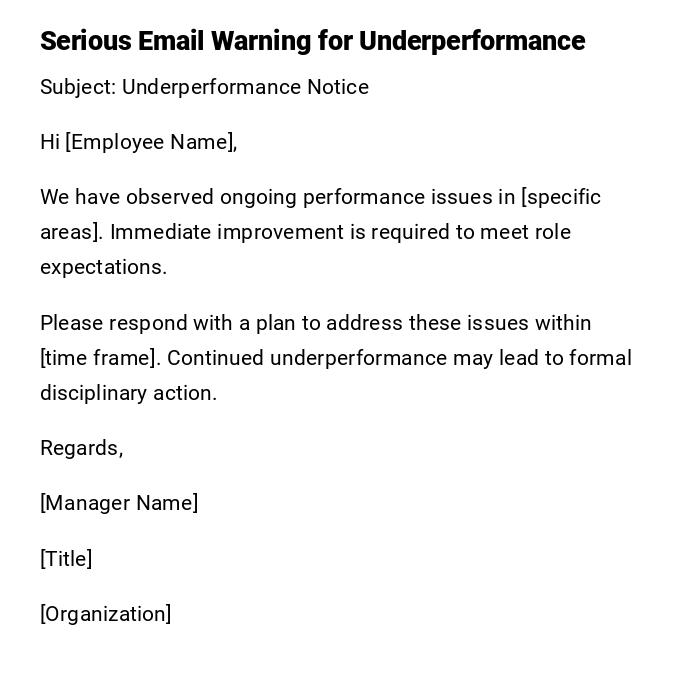Sample Reprimand Letter For Poor Performance
[Your Name]
[Your Title/Position]
[Company/Organization Name]
[Address]
[City, State, ZIP]
[Email Address]
[Phone Number]
[Today's Date]
[Employee's Name]
[Employee's Position]
[Department Name]
[Company/Organization Name]
[Address]
[City, State, ZIP]
Dear [Employee's Name],
Subject: Reprimand for Poor Performance
I am writing to address the ongoing issue of your poor performance, which has come to my attention and is a matter of serious concern for the company. As an essential part of our team, we expect all our employees to meet the performance standards set forth by the organization. However, your recent performance has consistently fallen below the expected levels, which cannot be overlooked.
We understand that employees may face challenges from time to time, affecting their performance. As a company, we encourage open communication and are willing to provide support to help you overcome any obstacles you may be encountering. However, it is crucial that you take personal responsibility for your performance and take the necessary steps to improve.
Some specific areas of concern include [mention specific issues, such as missed deadlines, errors, decreased productivity, etc.]. This negatively impacts the team's overall performance and hampers our ability to meet organizational goals.
We have previously discussed your performance during our performance reviews and in informal conversations. Unfortunately, despite these discussions, we have not seen any significant improvement. As a result, we have no choice but to issue this formal reprimand.
Going forward, we expect you to take immediate action to address the performance issues mentioned above. Here are some steps you should take:
1. Analyze the reasons behind your poor performance and identify areas for improvement.
2. Communicate with your supervisor or manager regularly to seek guidance and feedback.
3. Engage in any training or professional development opportunities that will enhance your skills and knowledge.
4. Ensure that you manage your time efficiently to meet deadlines and achieve targets.
5. Seek assistance from your colleagues when necessary and collaborate effectively as part of the team.
Failure to improve your performance within a reasonable timeframe may lead to further disciplinary actions, up to and including termination of employment.
We are confident that you can overcome these challenges and regain your previous level of performance. The company is willing to support you in this process, but the ultimate responsibility lies with you.
Please acknowledge your receipt of this letter by signing and returning the attached copy. If you have any questions or need any clarification, do not hesitate to contact me.
We expect to see significant improvement in your performance moving forward. We hope that with the necessary effort and dedication, we can work together to resolve this matter.
Sincerely,
[Your Name]
[Your Title/Position]
[Company/Organization Name]
---------------------------------------------------------------------------
I acknowledge receipt of this letter:
Employee's Signature: _______________________
Date: _______________________
cc: Human Resources (for inclusion in personnel file)
Formal Reprimand Letter for Poor Performance
Subject: Reprimand for Unsatisfactory Performance
Dear [Employee Name],
This letter serves as a formal reprimand regarding your performance in your role as [Position]. Despite prior discussions and guidance, your recent work has not met the expected standards, specifically in [describe areas of poor performance].
We expect immediate improvement in your performance. Please treat this as an official notice and take corrective action. Failure to improve may lead to further disciplinary measures, up to and including termination.
Sincerely,
[Manager Name]
[Title]
[Organization]
Informal / Friendly Performance Reminder Email
Subject: Performance Concerns – Action Required
Hi [Employee Name],
I wanted to discuss some concerns regarding your recent performance in [specific task/area]. We’ve noticed that [describe issue], and it’s important to address this promptly.
Let’s work together to develop a plan to improve. Please schedule a time with me this week to discuss next steps.
Best regards,
[Manager Name]
[Title]
[Organization]
Serious / Professional Reprimand Letter
Subject: Official Notice of Performance Issues
Dear [Employee Name],
Following our recent performance evaluations, it has been determined that your work in [specific areas] does not meet the expectations outlined for your role. This letter serves as a formal reprimand.
You are required to improve your performance immediately. A review meeting will be scheduled in [time frame] to assess progress. Continued unsatisfactory performance may result in additional disciplinary actions.
Sincerely,
[Manager Name]
[Title]
[Organization]
Quick and Simple Reprimand Message
Subject: Immediate Attention Required – Performance
Dear [Employee Name],
Your recent performance in [specific task] has been below expectations. Please take immediate action to improve.
Thank you for your attention to this matter.
Regards,
[Manager Name]
[Title]
[Organization]
Heartfelt / Encouraging Reprimand Letter
Subject: Performance Improvement Guidance
Dear [Employee Name],
We value your contributions to [Organization], but recent performance in [specific areas] has fallen short of expectations. We believe you have the potential to improve and succeed.
Please review the attached guidance and take the necessary steps to address these concerns. We are committed to supporting your growth.
Sincerely,
[Manager Name]
[Title]
[Organization]
Provisional / Preliminary Performance Warning Letter
Subject: Preliminary Warning Regarding Performance
Dear [Employee Name],
This letter is a preliminary notice regarding your performance issues in [specific tasks]. While this is not a final disciplinary action, it is important to address these concerns immediately.
Please schedule a meeting to discuss a performance improvement plan.
Sincerely,
[Manager Name]
[Title]
[Organization]
Formal Written Warning for Repeated Poor Performance
Subject: Written Warning – Continued Unsatisfactory Performance
Dear [Employee Name],
Despite previous feedback and support, your performance in [specific areas] continues to fall below expectations. This constitutes a formal written warning.
You are required to implement corrective measures immediately. Further failure may result in disciplinary action, including termination.
Sincerely,
[Manager Name]
[Title]
[Organization]
Serious Email Warning for Underperformance
Subject: Underperformance Notice
Hi [Employee Name],
We have observed ongoing performance issues in [specific areas]. Immediate improvement is required to meet role expectations.
Please respond with a plan to address these issues within [time frame]. Continued underperformance may lead to formal disciplinary action.
Regards,
[Manager Name]
[Title]
[Organization]
What / Why is a Reprimand Letter for Poor Performance
- It is an official communication to document and address an employee’s unsatisfactory performance.
- Purpose: To formally notify the employee, provide guidance, and outline consequences.
- Serves as a legal and HR record for potential future actions.
Who Should Send a Reprimand Letter
- Direct supervisors or managers.
- HR department representatives.
- Senior management, in cases of serious performance issues.
Whom Should the Reprimand Letter Be Addressed To
- The employee underperforming.
- Copies may be provided to HR for official records.
- Occasionally shared with department heads for oversight.
When to Issue a Reprimand Letter
- After repeated performance issues despite verbal feedback.
- Following formal performance evaluations showing deficiencies.
- When immediate corrective action is required.
- Before considering further disciplinary measures.
How to Write and Send a Reprimand Letter
- Document specific performance issues with examples and dates.
- Maintain a professional and objective tone.
- Clearly state expectations, required improvements, and timelines.
- Send as an official letter for record-keeping, or email for quick acknowledgment.
- Retain a copy in employee’s HR file.
Requirements and Prerequisites Before Writing
- Evidence of underperformance (metrics, reports, or documented incidents).
- Records of prior verbal or written warnings, if any.
- Clear performance standards and expectations.
- Alignment with HR policies and company disciplinary procedures.
Formatting Guidelines for a Reprimand Letter
- Length: 1–2 pages.
- Tone: Formal, serious, and professional; can include encouragement if appropriate.
- Structure: Subject, greeting, statement of concern, evidence/examples, corrective instructions, consequences, closing.
- Attachments: Performance reports or improvement plan if necessary.
After Sending / Follow-up Actions
- Schedule a meeting to discuss improvement plan.
- Monitor performance and document progress.
- Provide additional support, training, or guidance.
- Reassess and issue further warnings if performance does not improve.
Pros and Cons of Sending a Reprimand Letter
Pros:
- Establishes a formal record.
- Provides clarity and direction to the employee.
- Encourages accountability and improvement.
Cons:
- Can impact employee morale if not handled sensitively.
- May lead to tension in the workplace.
- Requires careful documentation to avoid legal issues.
Tricks and Tips for Effective Reprimand Letters
- Be specific and objective; avoid personal attacks.
- Include measurable expectations and deadlines.
- Use a tone that balances seriousness with support.
- Keep a copy for HR records.
- Follow up promptly to assess improvement.
Common Mistakes to Avoid
- Vague or generalized complaints.
- Mixing multiple unrelated issues in one letter.
- Using an overly harsh or emotional tone.
- Failing to provide clear guidance for improvement.
- Neglecting HR policy compliance.
Elements and Structure of a Reprimand Letter
- Subject: Clearly state the letter's purpose.
- Greeting: Address the employee formally.
- Introduction: State reason for writing.
- Evidence/Examples: Specific incidents or metrics.
- Required Action: Steps for improvement.
- Consequences: Outline potential outcomes for continued poor performance.
- Closing: Professional sign-off.
- Signature: Manager’s name, title, and date.
- Attachments: Performance reports or improvement plan if necessary.
Does it Require Attestation or Authorization
- Usually signed by the employee’s direct supervisor or HR representative.
- May require acknowledgment from the employee, often with a signature.
- Some organizations require copies to be filed in HR for official record-keeping.










 Download Word Doc
Download Word Doc
 Download PDF
Download PDF